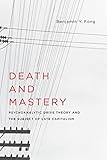Death and Mastery : Psychoanalytic Drive Theory and the Subject of Late Capitalism / Benjamin Fong.
Material type: TextSeries: New Directions in Critical Theory ; 61Publisher: New York, NY : Columbia University Press, [2016]Copyright date: ©2016Description: 1 online resource (240 p.)Content type:
TextSeries: New Directions in Critical Theory ; 61Publisher: New York, NY : Columbia University Press, [2016]Copyright date: ©2016Description: 1 online resource (240 p.)Content type: - 9780231176682
- 9780231542616
- 150.195 23
- BF175.5.D4 F66 2016
- BF175.5.D4 F66 2017
- online - DeGruyter
- Issued also in print.
| Item type | Current library | Call number | URL | Status | Notes | Barcode | |
|---|---|---|---|---|---|---|---|
 eBook
eBook
|
Biblioteca "Angelicum" Pont. Univ. S.Tommaso d'Aquino Nuvola online | online - DeGruyter (Browse shelf(Opens below)) | Online access | Not for loan (Accesso limitato) | Accesso per gli utenti autorizzati / Access for authorized users | (dgr)9780231542616 |
Frontmatter -- Contents -- Acknowledgments -- Introduction: In Defense of Drive Theory -- Part I: Dream -- 1. Death, Mastery, and the Origins of Life -- Part II: Interpretation -- 2. Between Need and Dread -- 3. Aggressivity in Psychoanalysis (Reprised) -- Part III: Working Through -- 4. The Psyche in Late Capitalism I -- 5. The Psyche in Late Capitalism II -- Conclusion -- Notes -- Bibliography -- Index
restricted access online access with authorization star
http://purl.org/coar/access_right/c_16ec
The first philosophers of the Frankfurt School famously turned to the psychoanalytic theories of Sigmund Freud to supplement their Marxist analyses of ideological subjectification. Since the collapse of their proposed "marriage of Marx and Freud," psychology and social theory have grown apart to the impoverishment of both. Returning to this union, Benjamin Y. Fong reconstructs the psychoanalytic "foundation stone" of critical theory in an effort to once again think together the possibility of psychic and social transformation. Drawing on the work of Hans Loewald and Jacques Lacan, Fong complicates the famous antagonism between Eros and the death drive in reference to a third term: the woefully undertheorized drive to mastery. Rejuvenating Freudian metapsychology through the lens of this pivotal concept, he then provides fresh perspective on Theodor Adorno, Max Horkheimer, and Herbert Marcuse's critiques of psychic life under the influence of modern cultural and technological change. The result is a novel vision of critical theory that rearticulates the nature of subjection in late capitalism and renews an old project of resistance.
Issued also in print.
Mode of access: Internet via World Wide Web.
In English.
Description based on online resource; title from PDF title page (publisher's Web site, viewed 02. Mrz 2022)


